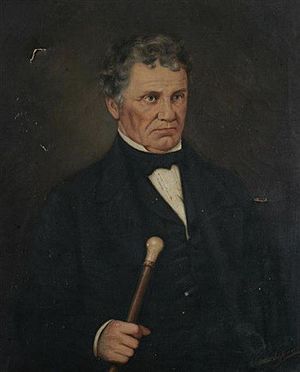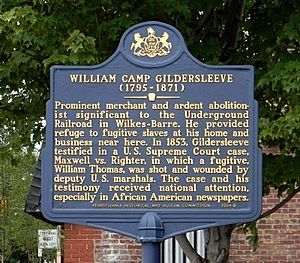William Camp Gildersleeve facts for kids
William Camp Gildersleeve (1795-1871) was a merchant and abolitionist who lived in Wilkes-Barre, Pennsylvania. His home was a safe stop on the Underground Railroad, a secret network that helped enslaved people escape to freedom. He became famous among abolitionists for speaking in front of the U.S. Supreme Court in 1853. This was for an important case called Maxwell v. Righter, which involved a person who had escaped slavery.
Contents
Who Was William Camp Gildersleeve?
Early Life and Family
William Camp Gildersleeve was born on December 6, 1795, in Liberty County, Georgia. His parents were Renchie Norman and Rev. Cyrus Gildersleeve. His father was a pastor and also owned a cotton plantation. William said that seeing slavery on his family's plantation made him dislike it very much. He had five brothers and sisters. His mother passed away in 1807. His father then married Frances Caroline Wilkinson, and they had seven more children.
Moving North
Soon after his father remarried, the family moved north. Rev. Cyrus Gildersleeve became the pastor of a Presbyterian Church in Wilkes-Barre. He bought a house on Northampton Street. One big reason for the move was so his children could get a better education.
Family Life in Wilkes-Barre
In 1817, William Camp Gildersleeve married Nancy Spencer Riggs from Mendham, New Jersey. They had a son named Cyrus Norman in 1819. For a while, they lived in Morristown, New Jersey. But they moved back to his father's house in Wilkes-Barre before 1822. From there, William opened a dry goods store on Market Street.
On September 25, 1822, William and Nancy had a daughter, Ann Elizabeth. After she was born, William moved his family to a new house. It was on the corner of Franklin and Union Street in Wilkes-Barre. They had another daughter, Mary, in 1826. Two years later, William bought a different house on Franklin Street. In September 1830, his wife Nancy died. His sister, Sarah, came to help care for the children. But she left a few months later when she got married. After this, William married Mary Gardiner from Philadelphia. Sadly, his son Cyrus Norman died in 1836 when he was only 17 years old.
Helping Others: The Underground Railroad
By 1837, Gildersleeve was well known for being against slavery. He ran a stop on the Underground Railroad from his home in Wilkes-Barre. He would help people who had escaped slavery travel north. Their next stops were usually in Scranton, Abington, or Montrose. Two people who had escaped slavery themselves, Lucy Washburn and Jacob Welcome, helped him with his efforts.
Standing Up for What's Right
In 1837, Gildersleeve invited a famous abolitionist to speak out against slavery. This speaker had been turned away by churches and politicians before. Because of this, an angry group of people damaged Gildersleeve's home.
Two years later, he invited another abolitionist to speak. This time, an angry crowd paraded the speaker through the streets. They either covered him with black dye or with tar and feathers. The speaker survived this terrible event. But no one who did it was ever arrested.
William Camp Gildersleeve passed away in 1871.
A Big Court Case: Maxwell v. Righter
The Story of William Thomas
On September 3, 1853, some U.S. Federal Marshals found a man named William Thomas. He was working at the Phoenix Hotel in Wilkes-Barre under the name Bill. The officers knew he was an escaped slave. They tried to capture him. Thomas tried to defend himself with a fork and a knife. A fight broke out, and Thomas managed to escape into the Susquehanna River. He shouted that he would rather die than be taken back to slavery. The officers threatened to shoot him. But local people stopped them. The officers were chased away, and Thomas escaped. Later, a group of women found him in a cornfield and helped him with his injuries.
Gildersleeve's Brave Testimony
The federal officers were later taken to court for "causing a riot." This was the U.S. Supreme Court case called Maxwell v. Righter. William Camp Gildersleeve spoke during the trial. He spoke strongly against the Fugitive Slave Act itself. This law made it easier for escaped slaves to be captured. He also spoke against the actions of Judge Grier, who had sided with the marshals.
His Lasting Impact
Gildersleeve's testimony in the Maxwell v. Righter case made him famous as an abolitionist across the country. His words were especially praised in African American newspapers.
In 2004, the Pennsylvania Historical and Museum Commission put up a special marker. It is on East Ross Street in Wilkes-Barre, Pennsylvania. It tells about William Camp Gildersleeve's important work:
"Prominent merchant and ardent abolitionist significant to the Underground Railroad in Wilkes-Barre. He provided refuge to fugitive slaves at his home and business near here. In 1853, Gildersleeve testified in a U.S. Supreme Court case, Maxwell vs. Righter, in which a fugitive, William Thomas, was shot and wounded by deputy U.S. marshals. The case and his testimony received national attention, especially in African American newspapers."
Descendants
- Thomas H. Atherton
- Charles Henry Atherton
 | Dorothy Vaughan |
 | Charles Henry Turner |
 | Hildrus Poindexter |
 | Henry Cecil McBay |



